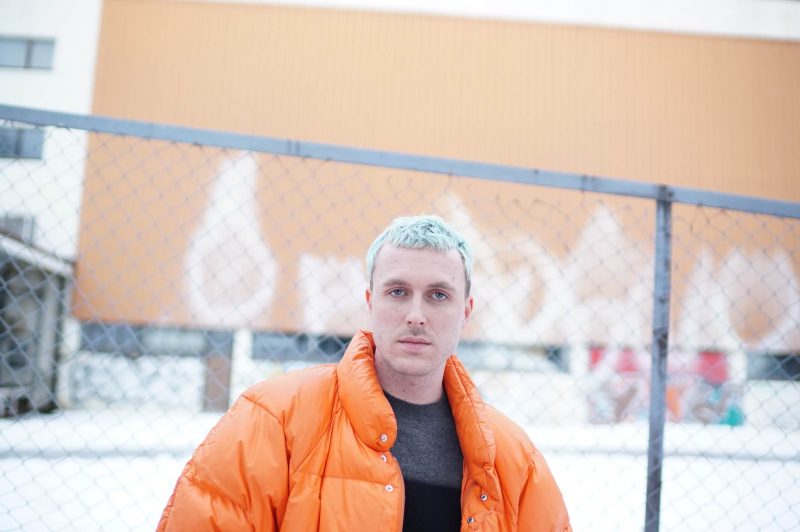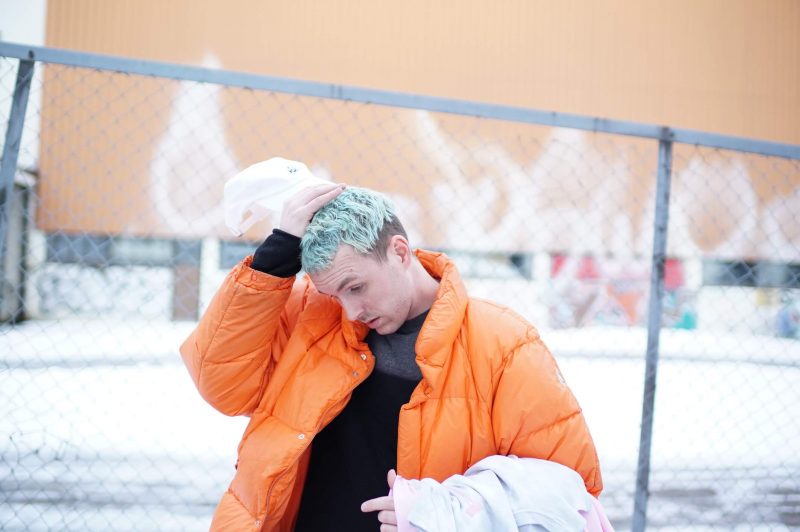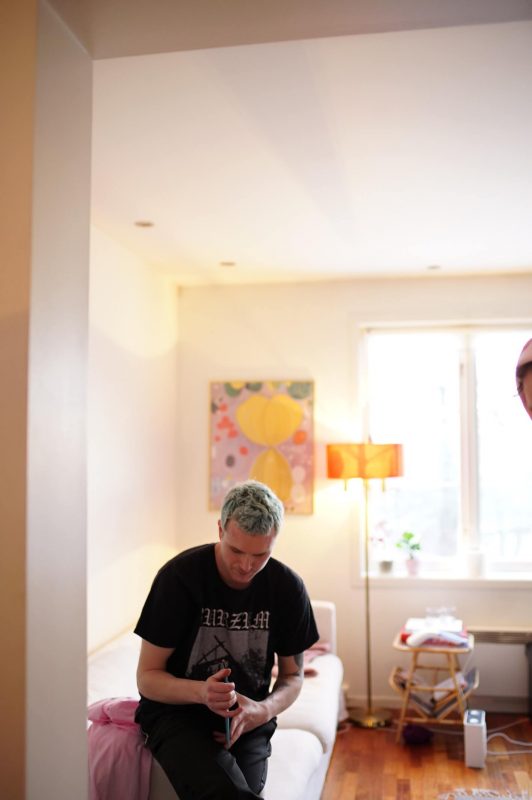Gundelach Exclusive FAULT Magazine Interview

Interview: Kee Chang
Photography: Simen Skari
Norway’s Gundelach, a.k.a. Kai Gundelach, released his self-titled debut EP in 2017, which secured him a Pop Album nomination at Spellemannprisen (the Norwegian equivalent to the Grammys). Last week, the DJ-turned-solo artist unveiled his debut LP, Baltus, a thoughtful and inspired collection of tracks that continues to showcase his Nordic-noir sensibilities and haunting, falsetto vocals. It’s infused with undeniable feeling that’s sincere and melodies that are unshakably catchy. And while deeply introspective lyrics set to gloom-tinged, dreamy synth-pop is nothing new, most other artists use blunt chisels on big slabs—Gundelach is working in scrimshaw. Among the LP’s stable of uncommonly spectacular tracks, “Duck Hunting” and “Past the Building” are sonic checkpoints that seem to do this still-infant artist on the rise most justice. Just don’t expect confetti canons. Baltus is a porcelain sorrow.
FAULT: Is Gundelach a common surname in Norway? How often do you get asked about your moniker?
Gundelach: It’s not common at all, actually. Even Norwegian journalists ask me that same question. It’s a German/Danish name. I don’t come from a German family, but I guess there were some ancestors.
FAULT: Maybe we can start with your most recent single off Baltus: “Past the Building” featuring ARY.
Gundelach: That track means a lot to me. It came together quite quickly. ARY and I had just gotten to know each other in the studio. I helped her with some of her tracks and she helped me with some of mine. I feel like we make a pretty good team writing the lyrics and the melodies. The track is about relationships that are a bit toxic. I think it’s the only track that I listen to pretty regularly after finishing the album.
https://m.youtube.com/watch?v=0EqODCPBAZQ
FAULT: So “Past the Building” came together pretty fast. Is that usually the case?
Gundelach: It’s really different for every track. When you write with another person like that, you don’t sit for a long time and wonder whether what you wrote is good or not because you get confirmation right away, you know? If you sit with someone that you respect musically and that person says, “That’s a really good melody,” you don’t have to listen to it over and over again for days, which can happen if I write alone.
FAULT: Going way back now, your first-ever single in Scandinavia was “Alone in the Night.” It’s another “melancholic daydream” as you’ve describe your sound in your own words. What inspired that cut?
Gundelach: I was pretty heartbroken at the time. The premise of that song is about the feeling you have when you’re in love with someone, but you don’t know if the feeling is mutual anymore. It’s that place where you kind of know it isn’t, but you’re too afraid to ask so you go around thinking all these dark thoughts. I had this studio just outside of Oslo at the time. I was just sitting in the studio by myself and I had just figured out how I wanted to make music, which I had been trying to figure out for three to four years.
FAULT: In every relationship, there’s one person who loves the other person more. It’s devastating, isn’t it?
Gundelach: I’ve thought about this a bunch of times. It’s not always a bad thing, though, because it can turn from one side to the other. But it is always one person that loves the other person at least a little bit more.
FAULT: On the second-ever track you released called “Spiders,” I know you started with long chords, improvised vocal melody, and then wrote the lyrics. Is that a natural progression for you with songs?
Gundelach: Yeah, that’s kind of my go-to method for writing because I tend to improvise in gibberish. I almost always start with the arrangement of instruments to have two bars or something and then improvise over that in gibberish English. I think that’s pretty cool because, when you sing in gibberish like that, subconsciously, you always say some words that are really good. If you let yourself improvise, you don’t have time to overthink stuff. Then I build the lyrics around those words. I really like working like that.
FAULT: When something big unexpectedly happens—when Pharrell plays “Spiders” on Beats 1–does that feel like a seismic event? Does it ripple out into other opportunities in a way that’s very cause and effect?
Gundelach: Of course it’s always cool when stuff like that happens and I remember that particular instance really well. I was in Berlin. I had been clubbing the night before. My phone rang and it was my manager saying that I had to turn on the radio because Pharrell is playing my song. Of course that’s huge. But I don’t know how much it did for me. I got exposed to new listeners, I guess. For me, and for many other artists also, when stuff like that happens—when you get confirmed for a really cool festival—it’s always cool, but you’re also thinking about the next thing. I wish it wasn’t always like that. I wish you could just appreciate the cool things that happen in your life, instead of thinking about what your next goal is. It’s like buying a Porsche and then sitting in that Porsche thinking about wanting a Ferrari or something.
FAULT: What do you remember from your earliest days performing live and transitioning out of DJing?
Gundelach: That was pretty intense because, even though I had been making music for quite a few years, I shared it with almost no one. I was in the Oslo club community and culture through DJing and knew a lot of music people that knew I made music, but they hadn’t heard it. I was just so nervous. You couldn’t talk to me at all for two hours before I would play. I just remember being super uncomfortable. Now it’s something I can control. And I guess I say that but yesterday I performed on live radio and chocked up on the first line of a song. It’s weird when you have to sit down to do an interview and talk in a low voice like I am now and then have only ten seconds before you have to perform. Your voice isn’t warmed up at all. It went fine, though. I didn’t stop the song or anything. I just came in wrong, I guess.
FAULT: If anything, I think that makes you more relatable to people listening in. It’s disarming and human.
Gundelach: They told me that same thing after the show. It’s true. I guess if you choke up and you’re unable to perform at all, that’s not very good, but if you have a bad start and you get really into it by the end, you’re golden. As you say, it’s a human thing. People see that you’re just a dude trying to sing a song.
FAULT: I know there was a tragedy in your personal life when you flew to New York City to record the EP in 2015. [Editor’s Note: Kai learned upon arriving in the city that his friend back home committed suicide.) Did you find that colouring the material you had already been working on in a different way?
Gundelach: It’s crazy. I had worked out the songs before I got there. When that happened, the only thing that felt right was to be in that studio and just record. It was so weird and scary and everything. Suddenly, all those songs had a different meaning to them. It definitely coloured the whole thing. When you’re emotional, that affects your singing—you hear it in the voice. That was an intense experience.

FAULT: Music entered your life early it seems. You were making music for six years by the time you went public. You sang in children’s theatre at age nine. You learned guitar at ten. As you said, you were nervous to share your work, so what opened up that possibility? Did it become a necessity for you?
Gundelach: The thing is, it wasn’t necessarily that I was nervous. It was just that I wanted to be good enough before I put anything out there. I think a lot of artists I know maybe jumped into it a bit too quickly because they had some demos and a manager reached out to them or a record label reached out. I just wanted to be good enough at the craft before I released anything so I could have control in both the production and the way it’s presented to the public. I wanted to have creative control so I waited until I felt I was ready. But then I guess I wasn’t because you’re never ready. You have to jump into it at some point.
FAULT: Do you think a lot of DJs have the desire—sometimes the secret desire—to make original music?
Gundelach: I do think a lot of DJs have the desire. But most of them want to make club music because they’re in that scene. That’s what was different with me, I guess. I didn’t want to make club music necessarily. I wanted to make music that’s quieter than what I’m putting out now honestly. In the beginning, my songs were just acoustic guitar and maybe one synth. It was really mellow. Then I started adding drum machines. I got more interested in analog gear and hardware. It was a natural progression to introduce that into the music. I guess I had a really different dream for myself when I was DJing because I didn’t want to be playing clubs. I wanted to play stages and nice rooms, and to have a live thing with a band. It’s different.
FAULT: Can you tell me about this unique work experience from your past where you, from what I understand, sang to old people as a sort of therapy? It really underscores music’s capacity to heal.
Gundelach: I felt a bit underqualified for the job. But I felt like I got enough from it on a personal level because it was really important work. I had a great time with those people. They were mostly demented people. You would be sitting there having a normal conversation with one of them and they would start over and over again. They’re just living in a loop, you know? It’s a bit scary. Music has this function where it allows the brain to remember. They suddenly “wake up” when they hear music from their past. I couldn’t play everything on the piano. I had to learn all these old songs and it took up too much time for me to continue so I didn’t have the job for that long. But it was really meaningful to me at the time.
FAULT: Do you still have ambitions to act? I know that’s been a part of your narrative as well.
I do, yeah. My synth player’s girlfriend is actually a renowned director here in Norway and she asked me a couple of times to come and try out stuff with acting. I haven’t gotten any parts yet, but I’m not really working to get them either. If the right project is there for me in the future, I would love to. It’s also a bit scary to jump back on the horse after not having done it in such a long time, I guess.
FAULT: Where do you find yourself pulling a lot of inspiration from, apart from music?
Gundelach: I’m not reading so much right now, but I tend to read a lot. There’s this Norwegian author that you should check out named Kjell Askildsen. He’s the master of short stories in Norway, but he’s also pretty acclaimed worldwide. I have all of his stories. I sometimes read to get into the headspace that I want to be in—not the authors’ necessarily, but into the headspace of the literature. The same goes for Oscar Wilde and Hemingway. That’s a good way to get into the right mood to write music, for me at least.

FAULT: What new challenges did you face while working on Baltus? Did it feel very different in the studio?
Gundelach: It did because this was the first time where I was the main producer and it’s my first album. I had a technician who also co-produced some stuff, but mainly, I worked as the one producer and that was really different. We also had a kind of deadline that was long so it was really intense. It was every day, all day type of thing in a room with no windows in this huge building. We had to go up to the roof at least every third hour to get some light so you could feel that it was daytime. And since this is an album, I really wanted to make it a cool listening experience from beginning to end. I worked super hard on the tracklist. There’s one song called “Control” that we worked on for a week, but all the other songs were a lot quicker and I liked that. I hate it when you can’t figure out one section of a song and you end up changing it like 12 times. You get so sick of the song and end up hating it, you know? Sometimes it feels good to start on the right path and then you can just finish it pretty quickly. I’m happy with the result.
FAULT: Deadlines can be good, too, right? With anything creative, you could conceivably work on it forever.
Gundelach: That’s true. Deadlines are really important. It’s a really good thing.
FAULT: Are you excited to go back on tour soon?
Gundelach: I’m really excited, but I’m a bit terrified as well because we’re going to some European cities that I’ve never played before. I just hope that people come to the shows. I’m trying to have a bit of a different set-up to make stuff even more organic and depend less on backing tracks by bringing more hardware onstage. It’s an overwhelming project right now, but I think It’s going to be really nice in the end.
FAULT: I found a YouTube clip of you performing in the cabin of a plane. That had to be a weird experience.
Gundelach: I think that’s one of the weirdest things I’ve done in my life. If I got asked again, I would say no because it was super awkward. Those people hadn’t signed up for any concert. You’re just standing up there with really shitty speakers. But it was kind of cool as well, I guess. They paid pretty well so that was nice.
FAULT: And lastly, what is your FAULT?
Gundelach: Oh, shit—my fault… It’s my fault that I play too much computer games right now. I’m really into that stuff nowadays. It tends to eat a lot of my time, which should be spent on planning this tour.
FAULT: Which games are you playing?
Gundelach: I’m playing this game called PlayerUnknown’s Battlegrounds. I play Counter-Strike as well.
Baltus is out now. For more information on Gundalech, visit www.gundelachmusic.com